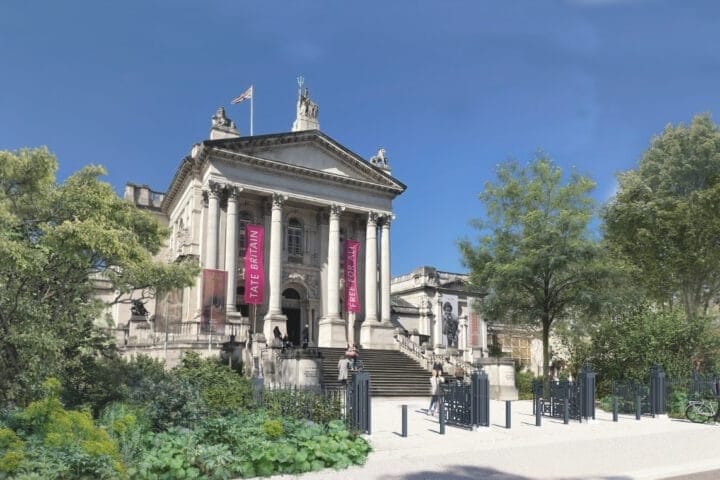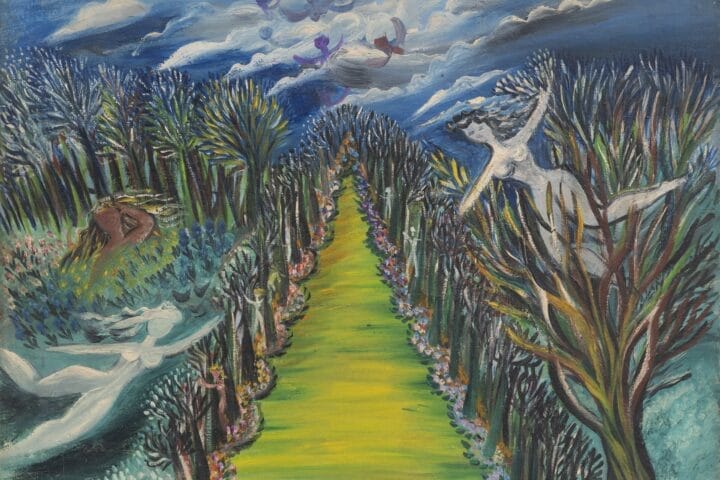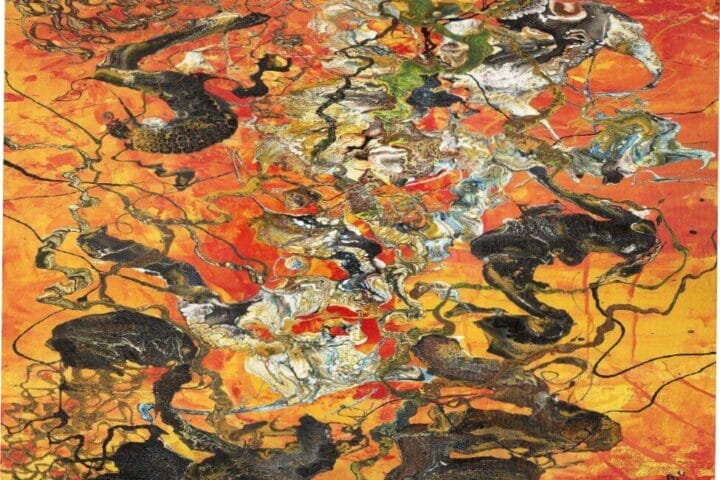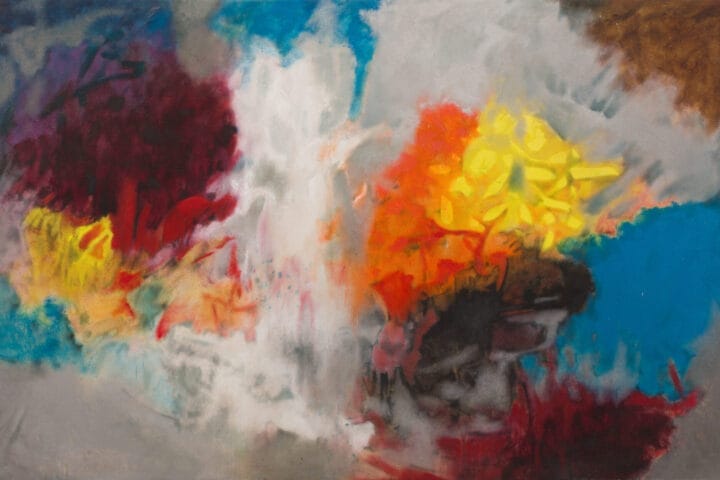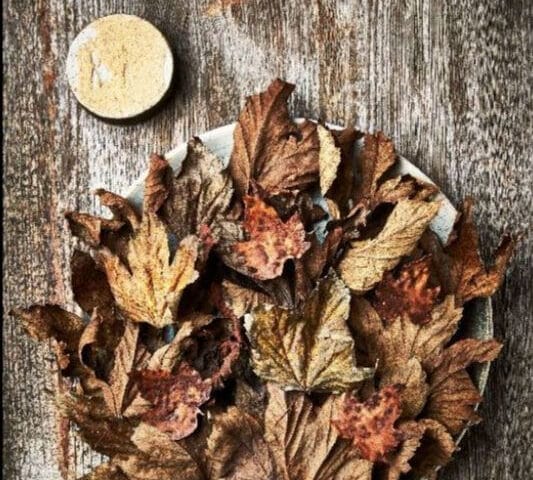Sean Kelly is delighted to present Buried Sunshine, Julian Charrière’s highly anticipated first solo exhibition at Sean Kelly, Los Angeles. Buried Sunshine explores the entangled histories of Los Angeles and the discovery of petroleum there in the late 19th century, a catalyst which industrialized the region and transformed LA into the second largest city in the United States. Capturing the delirium of the petroleum industry and the burning of lithic landscapes, focused through the lens of Los Angeles—the world’s largest urban oil field—Charrière brings his film Controlled Burn together with sculptures and a new series of heliographic photographs, to unearth the ‘fossilized sunshine’ upon which the mythos of the city was built. Examining the material reality of hydrocarbons and how our modern world is organized around the energy they provide, the exhibition draws parallels between the image-making machine of Hollywood and our dependence on fossil fuels, both of which exert gravitational forces that bend our perceptions of reality. There will be an opening reception on Thursday, September 14, from 6-8pm. The artist will be present.
In his new series Buried Sunshines Burn, Charrière reveals Los Angeles as a spatial anomaly: a place built not only by hydrocarbons, but on top of them, with 5000 active oil wells hidden throughout the city. Employing heliography, one of photography’s oldest techniques, first developed by French inventor Nicéphore Niépce in 1822, Charrière uses a light-sensitive emulsion incorporating naturally occurring tar collected from the La Brea, McKittrick, and Carpinteria Tar Pits in Califorina, Charrière to create photographic imprints on highly polished stainless-steel plates of local oil fields, shot from a bird’s eye perspective. The series surveys some of the state’s largest reserves, including the immense Kern River Oil Field in the San Joaquin Valley, the Placerita and Aliso Canyon Oil Fields in Santa Clarita, and the giant Inglewood Oil Field situated in the heart of LA.
Charrière’s film Controlled Burn invites viewers on a cosmic journey through deep time, soaring through an aerial landscape of imploding fireworks. Shot with a first-person drone, this disorienting voyage takes place in open pit coal mines, decommissioned oil rigs, and rusting cooling towers. Amid whirling smoke and fire, implosions are intercut by flashing images of primordial unfurling ferns and fluttering moths—beings that evolved during the carboniferous geological period. Appearing at subliminal speed, Charrière offers these organisms as both spirit guides and living tokens for the vitality of fossil fuels and as markers for how the agency of coal, oil, and tar has come to haunt our contemporary imagination. Linking celebratory pyrotechnics with architectures of extraction, explosive momentum, and technological obsolescence, Controlled Burn stages the fantasy of a dramatic return to sources of energy via implosion.
Also featured in the exhibition are two monumental obsidian sculptures, Thickens, pools, flows, rushes, slows. Made from large pieces of volcanic glass–cooled magma which has erupted from the Earth’s core–the works are punctuated by polished concave disks. Charrière draws on this material as an ancient means of divination, believed by both Mayan and Aztec civilizations to unlock doors to other times and realms. With obsidian being a readily available resource in Mesoamerica, the hardness of the glass also made it one of the earliest materials to be traded across vast distances. In the present, the dark vitality of the obsidian is eerily reminiscent of our technological black mirrors, themselves questionable portals beyond the present.
As an exhibition, Buried Sunshine expands on Julian Charrière’s ongoing inquiry into how our species inhabits the world, and how it in turn inhabits us. Charrière combines Los Angeles’s unique industrial history with the iconic image-making for which the city is famous, creating an immersive landscape where our most urgent ecological concerns can be addressed. Utilizing photography, film and sculpture, Buried Sunshine investigates Los Angeles through the lens of geological time, in the process urging viewers to reflect on how our relationship with the materials we appropriate as fuel come to inform how we perceive the world around us.
Julian Charrière was born in Morges, Switzerland, in 1987 and currently lives and works in Berlin. His work has been the subject of solo presentations at major international institutions, including SFMOMA, San Francisco; Langen Foundation, Neuss; Dallas Museum of Art, Dallas; MAMbo, Bologna; Berlinische Galerie, Berlin; Parasol Unit Foundation, London; Musée des Beaux-Arts, Lausanne; and Centre Culturel Suisse, Paris. Charrière has also been prominently featured at the 59th Biennale di Venezia; 57th Biennale di Venezia; the Antarctic Biennale; the Taipei Biennial; the 12th and 16th Biennale de Lyon; Centre Pompidou, Paris; Sprengel Museum, Hannover; Aarhus Kunstmuseum, Aarhus; SCHIRN Kunsthalle, Frankfurt; Hayward Gallery, Southbank Centre, London; and Palais de Tokyo, Paris. Julian Charrière is a former participant of the Institute for Spatial Experiments, an experimental education and research project at the Berlin University of the Arts led by Olafur Eliasson. A nominee for the Prix Marcel Duchamp in 2021, Charrière in 2022 received the 14th SAM Prize for Contemporary Art.
The publication Julian Charrière: Controlled Burn documents his solo exhibition curated by Dehlia Hannah and Nadim Samman, which was on view at the Langen Foundation in Neuss, Germany from September 4, 2022 – August 6, 2023. A meditation on the flame as a figure of excess, containment, and renewal for our warming planet, it features essays by Emanuele Coccia, Dehlia Hannah, and Nadim Samman. It is published by Mousse Publishing.
For additional information on Julian Charrière, please visit skny.com and julian-charriere.net
Sean Kelly, Los Angeles
1357 N Highland Ave, Los Angeles, CA 90028, United States

